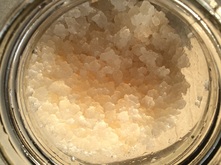
I make and drink about 1-2 liters of kefir water a day. Grains are really sturdy things, they multiply like crazy, and can live through most events. Most grains would never need to be rinsed or washed.
Recently, my grains started to get a bit smelly, then they got really rotten egg / sulfur smelly, and so did my kefir water. The kefir water got so bad, I could not drink it, nor even use it to wash hair - it was that smelly! I had about 3 cups of grains at the moment, and didn't want to lose them all. In the past this happened a couple times, and a quick rinse with water was all that was needed, but this time it was really strong and no amount of water rinsing was working.
Apparently the slimy texture of the water and the rotten egg smell might come from too much minerals - which would make sense as I use coconut sugar which is full of minerals. Also, the weather just changed from summer to winter here in Hong Kong, and my brews went from 12 hours to 24+ hours, but I had not yet reduced the amount of sugar I was using.
I tried to find something online about rinsing grains, but there is little info out there - and what I did find was either too simple (rinse with water, which I had previously tried) or much too complicated involving boiling water, cooling water, egg shells, etc...
My solution was simple:
Mine were then perfectly opaque and not smelly at all!
Best off all, 24 hours after that I was back to enjoying perfect tasting water kefir - yeah!
To prevent this from happening again, I am using less sugar.
I also rotate my grains - keeping them in two different jars in the fridge, and using one jar for a week, then the other jar, so they get a chance to rest.
Just a note on the timing - in summer in Hong Kong, it is hot and humid, and my kefir water takes 8-12 hours. In winter in Hong Kong, it is cool and dry, and my kefir water takes 24 hours.
Related Links
http://loulanatural.com/kefir-faq/
http://www.yemoos.com/faqwamain.html
http://www.culturesforhealth.com/rehabilitating-fixing-repairing-damaged-water-kefir-grains
http://chemistry.about.com/cs/foodchemistry/f/blbaking.htm
http://culinaryarts.about.com/od/bakingdesserts/a/Baking-Soda-And-Baking-Powder.htm
Recently, my grains started to get a bit smelly, then they got really rotten egg / sulfur smelly, and so did my kefir water. The kefir water got so bad, I could not drink it, nor even use it to wash hair - it was that smelly! I had about 3 cups of grains at the moment, and didn't want to lose them all. In the past this happened a couple times, and a quick rinse with water was all that was needed, but this time it was really strong and no amount of water rinsing was working.
Apparently the slimy texture of the water and the rotten egg smell might come from too much minerals - which would make sense as I use coconut sugar which is full of minerals. Also, the weather just changed from summer to winter here in Hong Kong, and my brews went from 12 hours to 24+ hours, but I had not yet reduced the amount of sugar I was using.
I tried to find something online about rinsing grains, but there is little info out there - and what I did find was either too simple (rinse with water, which I had previously tried) or much too complicated involving boiling water, cooling water, egg shells, etc...
My solution was simple:
- Rinse the grains in filtered water 2 or 3 times
- Put them in a 1 liter glass jar with plastic lid
- Add filtered water until they are all submerged
- Add 1 Tablespoon of baking soda
- Shake the jar, and put it in the fridge
- 12 hours later, rinse the grains from the jar
- If they are still smelly (mine were!), repeat the above steps
- 24 hours later, rinse the grains from the jar
Mine were then perfectly opaque and not smelly at all!
Best off all, 24 hours after that I was back to enjoying perfect tasting water kefir - yeah!
To prevent this from happening again, I am using less sugar.
- 2 liters of filtered water
- 3 Tablespoons of coconut sugar
- 4-8 Tablespoons of water kefir grains
I also rotate my grains - keeping them in two different jars in the fridge, and using one jar for a week, then the other jar, so they get a chance to rest.
Just a note on the timing - in summer in Hong Kong, it is hot and humid, and my kefir water takes 8-12 hours. In winter in Hong Kong, it is cool and dry, and my kefir water takes 24 hours.
Related Links
http://loulanatural.com/kefir-faq/
http://www.yemoos.com/faqwamain.html
http://www.culturesforhealth.com/rehabilitating-fixing-repairing-damaged-water-kefir-grains
http://chemistry.about.com/cs/foodchemistry/f/blbaking.htm
http://culinaryarts.about.com/od/bakingdesserts/a/Baking-Soda-And-Baking-Powder.htm




 RSS Feed
RSS Feed